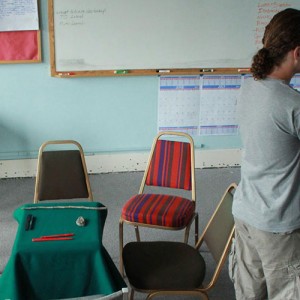49 minutes and 55 seconds.
How much language can you learn from a “fluent fool” in one minute? Evan Gardner and Willem Larsen discuss the value of even spending the shortest moments in “language hunting“, and also how to inspire more of their trained “language hunters” to go do just that. This podcast was recorded before their most recent workshop. At that workshop in San Francisco on April 12 and 13, they essentially solved these problems. Listening to this podcast will show you how Evan and Willem think through new challenges with applying WAYK.
1. Technique “Language Hunting“
- “Language hunters” we train haven’t been playing with their new amazing skills, haven’t reported hunting new language.
- New hunters consistently think they need to “squeeze in” this “language hunting“; like it requires a substantial time commitment.
- What exactly is the craft of “language hunting“, anyway?
- It blurs the boundaries between teacher and student; it makes those roles obsolete.
- You hunt language, not people. You take the “fluent fool” with you on the hunt.
- Everyone has something unique that you want to learn, no matter what their proficiency level. “Hunting” implies a courtship, a relationship based on exchange.
- Indigenous definitions of hunting really illuminate what we mean by “language hunting”.
2. Technique “Trophy Hunter”
- “Trophy Hunters” will slow your language revitalization down. Deprioritize teaching them.
- They do not want to teach language, just take it.
- Using this technique can wake up reluctant teachers to the choice they have; learn to teach, or go get spoon-fed somewhere else. Always prioritize teaching teachers.
3. Technique “What is that?”
- If you play no more than just “what is that?“, you’ve still done a huge amount. You’ve begun the journey!
- “What is that?” is really powerful. It starts real conversations.
4. Technique “Fluent Fool“
- The most challenging WAYK situation, and the situation for which it was designed: hunting your 90 year old Grandma’s language, without any other players to help you out.
- Can “fluent fool” sound negative? “Fool” means positive things to us.
- The court jester; the fool on the Tarot card. Important roles with a carefree, insightful wisdom.
5. Technique “Everybody Plays All-the-time”
- Play is the foundation for mastery.
- Play is an accelerated learning state.
6. Technique “Tea with Grandma“
- The archetypal language hunt, based on sharing a pleasurable experience with your “fluent fool”.
7. Technique “Bite-sized Pieces”
- Start with what you know can happen; playing for a minute, right now, right here.
- Don’t ask a “fluent fool” for time to “learn their language”; just ask “what is that?“.
8. Technique “Desert Island“
- We get asked a lot – how would you play WAYK on a desert island, with no common spoken language? Well…using WAYK, you’ll play the best charades of your life.
9. Technique “Bridge Language“
- In what contexts do you use sign for the “bridge language“? You’ll know instinctually.
10. Technique “Hunting Pack“
- “Language hunting” a “fluent fool” (as in the “Tea with Grandma” scenario) speeds up markedly when you have a team of players to back you up.
11. Technique “One-minute Language Hunt“
- Pick a language you don’t even want to learn, find any “fluent fool” who knows any language, and just play “what is that?“.
12. Technique “Where Are Your Keys?”
- Can you use WAYK to learn Superior speech?
- Is WAYK a game, or a comprehensive methodology of language learning?
- The WAYK core conversation is designed to give you a visceral experience of fluency and travel along the ACTFL scale, aka “Travels with Charlie“.
- It is also designed to help you master the WAYK techniques in an easy, controlled environment, so that you can use them out in the world while “language hunting“.
- It is a learning laboratory.






“Language Hunting is learning a langauge
as fast possible
becoming as fluent as possible
by engaging in conversations
in order to learn the language.”
Huh. That is pretty good, isn’t it?